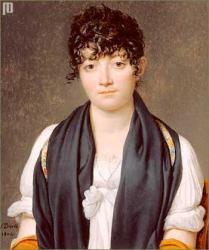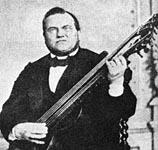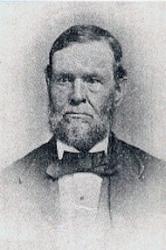Planning worship?
Check out our sister site, ZeteoSearch.org,
for 20+ additional resources related to your search.
- |
User Links
Person Results
‹ Return to hymnal






Export as CSV
Luise Reichardt

1779 - 1826 Person Name: C. Luise Reichardt Hymnal Number: 666 Composer of "ARMAGEDDON" in The Worshiping Church Caroline Luise Reichardt Germany 1779-1826. Born in Berlin to middle class parents and musical composers, she received some formal education and musical training from her father and his friends, but also was self-taught. Her grandfather was Konzertmeister, and her father was Kapellmeister at the court of Frederick, the Great. Louise was musical and had a good voice. She played piano and sang. In 1800 four of her own compositions were published along with a collection of her father’s songs. The Reichardts entertained well-known literary figures of the day. She later used poetry from Phillip Ludwig Achim von Arnim in a collection of 12 songs she composed. In 1809 she settled in Hamburg, Germany, where she made a living as a singing teacher and composed music. She also organized and directed a women’s chorus. She did behind-the-scenes conducting of music when she could. She was known for her untiring efforts in the production of Handel choral works, translating and preparing texts and choruses to be conducted by male counterparts. She also translated the Latin works of Hasse and Graun into German. She played a significant role in the formation of the German choral movement, a driving force in 19th century musical nationalism. She composed 75+ songs and choral pieces in various styles and accompaniments. Her husband-to-be, Friedrich August Eschen, died suddenly on the eve before their wedding. Her second husband-to-be, a painter, Franz Gareis, also died before their wedding. She died at Hamburg, Germany.
John Perry
Luise Reichardt
Oscar Ahnfelt

1813 - 1882 Hymnal Number: 367 Composer of "BLOTT EN DAG" in The Worshiping Church Oscar Ahnfelt (1813 -1882) was a Swedish singer and composer. He wrote the music for many of Lina Sandell’s hymns. A pietist, he raised some concern in the State-church, but his music was apparently so popular, King Karl XV gave him permission to play and sing in both of his kingdoms. Ahnfelt’s music has spread throughout the world; two of his best-known songs are “Children of the Heavenly Father” and “Day by Day.”
Laura de Jong
Oscar Ahnfelt
Grant Colfax Tullar

1869 - 1950 Person Name: Grant C. Tullar Hymnal Number: 684 Composer of "FACE TO FACE" in The Worshiping Church Grant Colfax Tullar was born August 5, 1869, in Bolton, Connecticut. He was named after the American President Ulysses S. Grant and Vice President Schuyler Colfax. After the American Civil War, his father was disabled and unable to work, having been wounded in the Battle of Antietam. Tullar's mother died when he was just two years old so Grant had no settled home life until he became an adult. Yet from a life of sorrow and hardship he went on to bring joy to millions of Americans with his songs and poetry.
As a child, he received virtually no education or religious training. He worked in a woolen mill and as a shoe clerk. The last Methodist camp meeting in Bolton was in 1847. Tullar became a Methodist at age 19 at a camp meeting near Waterbury in 1888.
He then attended the Hackettstown Academy in New Jersey. He became an ordained Methodist minister and pastored for a short time in Dover, Delaware. For 10 years he was the song leader for evangelist Major George A. Hilton. Even so, in 1893 he also helped found the well-known Tullar-Meredith Publishing Company in New York, which produced church and Sunday school music. Tullar composed many popular hymns and hymnals.
His works include: Sunday School Hymns No. 1 (Chicago, Illinois: Tullar Meredith Co., 1903) and The Bible School Hymnal (New York: Tullar Meredith Co., 1907). One of Grant Tullar's most quoted poems is "The Weaver":
My Life is but a weaving
Between my Lord and me;
I cannot choose the colors
He worketh steadily.
Oft times He weaveth sorrow
And I, in foolish pride,
Forget He sees the upper,
And I the under side.
Not til the loom is silent
And the shuttles cease to fly,
Shall God unroll the canvas
And explain the reason why.
The dark threads are as needful
In the Weaver's skillful hand,
As the threads of gold and silver
In the pattern He has planned.
He knows, He loves, He cares,
Nothing this truth can dim.
He gives His very best to those
Who chose to walk with Him.
Grant Tullar
--http://www.boltoncthistory.org/granttullar.html, from Bolton Community News, August 2006.
Grant Colfax Tullar
George Ratcliffe Woodward
1848 - 1934 Person Name: George R. Woodward Hymnal Number: 136 Harmonizer of "PUER NOBIS" in The Worshiping Church Educated at Caius College in Cambridge, England, George R. Woodward (b. Birkenhead, Cheshire, England, 1848; d. Highgate, London, England, 1934) was ordained in the Church of England in 1874. He served in six parishes in London, Norfolk, and Suffolk. He was a gifted linguist and translator of a large number of hymns from Greek, Latin, and German. But Woodward's theory of translation was a rigid one–he held that the translation ought to reproduce the meter and rhyme scheme of the original as well as its contents. This practice did not always produce singable hymns; his translations are therefore used more often today as valuable resources than as congregational hymns. With Charles Wood he published three series of The Cowley Carol Book (1901, 1902, 1919), two editions of Songs of Syon (1904, 1910), An Italian Carol Book (1920), and the Cambridge Carol Book
George Ratcliffe Woodward
Christopher M. Idle
b. 1938 Person Name: Christopher Idle Hymnal Number: 187 Author of "Jesus, Come! for We Invite You" in The Worshiping Church Christopher Martin Idle (b. Bromley, Kent, England, 1938) was educated at Elthan College, St. Peter's College, Oxford, and Clifton Theological College in Bristol, and was ordained in the Church of England. He served churches in Barrow-in-Furness, Cumbria; London; and Oakley, Suffolk; and recently returned to London, where he is involved in various hymnal projects. A prolific author of articles on the Christian's public responsibilities, Idle has also published The Lion Book of Favorite Hymns (1980) and at least one hundred of his own hymns and biblical paraphrases. Some of his texts first appeared in hymnals published by the Jubilate Group, with which he is associated. He was also editor of Anglican Praise (1987). In 1998 Hope Publishing released Light Upon the River, a collection of 279 of his psalm and hymn texts, along with suggested tunes, scripture references, and commentary.
Bert Polman
Christopher M. Idle
Carl P. Daw Jr.
b. 1944 Person Name: Carl P. Daw, Jr. Hymnal Number: 685 Author of "Christ the Victorious" in The Worshiping Church Carl P. Daw, Jr. (b. Louisville, KY, 1944) is the son of a Baptist minister. He holds a PhD degree in English (University of Virginia) and taught English from 1970-1979 at the College of William and Mary, Williamsburg, Virginia. As an Episcopal priest (MDiv, 1981, University of the South, Sewanee, Tennesee) he served several congregations in Virginia, Connecticut and Pennsylvania. From 1996-2009 he served as the Executive Director of The Hymn Society in the United States and Canada. Carl Daw began to write hymns as a consultant member of the Text committee for The Hymnal 1982, and his many texts often appeared first in several small collections, including A Year of Grace: Hymns for the Church Year (1990); To Sing God’s Praise (1992), New Psalms and Hymns and Spiritual Songs (1996), Gathered for Worship (2006). Other publications include A Hymntune Psalter (2 volumes, 1988-1989) and Breaking the Word: Essays on the Liturgical Dimensions of Preaching (1994, for which he served as editor and contributed two essays. In 2002 a collection of 25 of his hymns in Japanese was published by the United Church of Christ in Japan. He wrote Glory to God: A Companion (2016) for the 2013 hymnal of the Presbyterian Church (U.S.A.).
Emily Brink
Carl P. Daw Jr.
Robert Bridges

1844 - 1930 Hymnal Number: 231 Translator of "Ah, Holy Jesus" in The Worshiping Church Robert S. Bridges (b. Walmer, Kent, England, 1844; d. Boar's Hill, Abingdon, Berkshire, England, 1930) In a modern listing of important poets Bridges' name is often omitted, but in his generation he was considered a great poet and fine scholar. He studied medicine and practiced as a physician until 1881, when he moved to the village of Yattendon. He had already written some poetry, but after 1881 his literary career became a full-time occupation, and in 1913 he was awarded the position of poet laureate in England. Bridges published The Yattendon Hymnal (1899), a collection of one hundred hymns (forty-four written or translated by him with settings mainly from the Genevan psalter, arranged for unaccompanied singing. In addition to volumes of poetry, Bridges also published A Practical Discourse on Some Principles of Hymn-Singing (1899) and About Hymns (1911).
Bert Polman
===================
Bridges, Robert Seymour, M.A., son of J. J. Bridges, of Walmer, Kent, was b. Oct. 23, 1844, and educated at Eton and at Corpus Christi College, Oxford (B.A. 1867, M.A. 1874). He took his M.A. in 1874, but retired from practice in 1882, and now (1906) resides at Yattendon, Berks. He is the author of many poems and plays. He edition and contributed to the Yattendon Hymnal, 1899 (originally printed at the Oxford Univ. Press in parts—Nos. 1-25, 1895; 26-50, 1897; 51-75, 1898; 76-100, 1899). [Rev. James Mearns, M.A.]
--John Julian, Dictionary of Hymnology, New Supplement (1907)
Robert Bridges
Washington Gladden

1836 - 1918 Hymnal Number: 651 Author of "O Master, Let Me Walk with Thee" in The Worshiping Church Washington Gladden (1836-1918) was called to the First Congregational Church in Columbus, OH in 1882 and remained there for 32 years. In 1883-84 he was known for his success in fighting the corrupt Tweed Ring, for arbitrating the Telegraphers' Strike and the Hocking Valley Coal Strike. He attacked John D. Rockefeller, Sr. for giving $100,000 of "tainted money" to the Congregational Church's Foreign Missions program. Throughout his ministry he emphasized applying the gospel to life in America. He wrote "O Master, let me walk with thee" in 1879.
Mary Louise VanDyke
===================
Gladden, Washington, was born at Pottsgrove, Pennsylvania, Feb. 11, 1836; was educated at Williams College: and entered the Congregational Ministry. He was for some time editor of the New York Independent, and of the Sunday Afternoon. In the Sunday Afternoon, his hymn, "O Master, let me walk with Thee" (Walking with God), appeared in 3 stanzas of 8 lines, in March 1879. Of these stanzas i. and iii. are in Laudes Domini, 1884, and others.
--John Julian, Dictionary of Hymnology, Appendix, Part II (1907)
==================
Gladden, W., p. 1565, ii. Dr. Gladden has been Pastor of the First Congregational Church, Columbus, Ohio, since 1882. His hymn-writing has not been extensive. The most popular of his hymns is "0 Master, let me walk with Thee," noted on p. 1565, ii. It has come into somewhat extensive use during the last ten years. Additional hymns in common use include:—
1. Behold a Sower from afar. [The Kingdom of God.] In the Boston Pilgrim Hymnal, 1904, this is dated 1897.
2. Forgive, 0 Lord, the doubts that break Thy promises to me. [Doubting repented of.] Dated 1879, in The Pilgrim Hymnal, 1904.
--John Julian, Dictionary of Hymnology, New Supplement (1907)
Washington Gladden
James Ellor

1819 - 1899 Hymnal Number: 93 Composer of "DIADEM" in The Worshiping Church James Ellor United Kingdom 1819-1899. Born at Droylesden, Lancashire, England, he was trained as a hat maker. By age 18 he was leading the Methodist Wesleyan Chapel choir. He later worked for the railroad. In 1838 he brought his choir a new tune he had written for the hymn, “All hail the power of Jesus' name”. It became well received and has been used with the hymn ever since. In 1843 he emigrated to America and resumed the hat making trade. He died in New York City. It is the only hymn he is now remembered for.
John Perry
James Ellor
Doris Akers
1923 - 1995 Hymnal Number: 291 Author of "Sweet, Sweet Spirit" in The Worshiping Church Doris Mae Akers USA 1923-1995. Born at Brookfield, MO, one of nine siblings, her (inter-racial) parents divorced when she was age three. She then lived with her mother, who remarried when she was age six. They lived in Kirksville, MO. Some of her brothers lived with her father after the divorce. The family attended the Bethel AME Church in Kirksville, where she learned to play piano by ear at age six. She wrote her first song at age 10. In the 1930s she formed a singing gospel group with siblings, Edward, Marian, and Donald, who went by the name ‘Dot and the Swingsters’. Early in her career (1938) she moved to Los Angeles, CA. There she became known for her work with the ‘Sky Pilot Choir’, an integrated group that made recordings and appeared on Radio and TV across the country. Her fresh, modern arrangements of traditional negro spirituals drew large crowds from far and near, and increased her church’s attendance dramatically. Her choir group released three record albums. She recorded solos in 1963 and also collaborated with the Statemen Quartet in 1964. She ended working with the choir in 1965, but reunited with it again in 1974 to make a 4th recording for RCA Victor. In 1970 she moved to Columbus, OH, where she continued composing, recording, and traveling. In the 1980s she released a new gospel album each year on a regional Midwest label. She also released a few albums in Canada (not distributed in the U S). In the 1990s she began recording for the Gaither label and appeared in some of their TV productions and concerts. She was affectionately known as ‘Miss Gospel Music’, respected and admired by everyone in the gospel music business. By this time, she had mastered vocalization, keyboards, choir directing, arranging, composing, and publishing. She worked with many of the early pioneers in gospel music and authored gospel compositions, some selling millions of records for other performers and evangelists. In her final years she was Minister of Music at Grace Temple Deliverance Center, Minneapolis, MN. In 1994 she broke her ankle, and also discovered she had spinal cancer. She died at Edina, MN. She never married. She wrote 500+ songs. She received many awards over the years, including ‘Gospel Music Composer of the Year’ (for both years 1960 and 1961). In 1976, the city of Kirksville, MO, held “Doris Akers’ Day’, featuring her as the headline act, as part of the bicentennial celebration. Over 20,000 attended the celebration there. In 1992 she was honored by the Smithsonian Institution as ‘The Foremost Gospel Writer in the U S’. Her works include eight collections of music. In 2001 she was inducted into the Gospel Music Hall of Fame. In 2011 she was inducted into the Southern Gospel Music Hall of Fame.
John Perry
Doris Akers


 My Starred Hymns
My Starred Hymns


